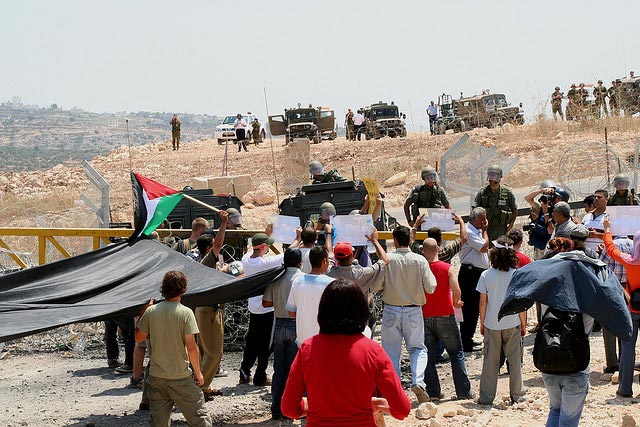
In the US, Dr. Martin Luther King showed that nonviolent protest works. His Selma to Montgomery marches in 1965 inspired passage of the Voting Rights Act that year, a landmark for US civil rights. In Palestine, Iyad Burnat, head of both the Bilin Popular Committee against the Wall and the Friends of Freedom and Justice in Bilin, has followed Dr. King’s example.
Bilin is a village of 2,000 residents, some 12 kilometers from the West Bank city of Ramallah. Since 2005, Iyad and his fellow villagers have organized weekly demonstrations to protest repeated Israeli assaults on village assets, in particular the building of a wall that separates farmers from their lands; the destruction of olive trees; the placing of a settlement less than 100 meters from the village boundary; and harmful travel restrictions – all in the name of protecting Israeli citizens.
Like Dr. King’s marches, the Bilin protests have some successes. They helped win Israeli court decisions that rerouted the wall (restoring almost a third of the village land) and blocked the construction of additional housing units in the nearby settlement.
The successes, however, have not come without fearsome human costs. Despite the nonviolent nature of the demonstrations, the Israeli military regularly responds to the Friday protests with tear gas, contaminated water sprays and rubber-coated steel bullets – which have already killed two protesters in Bilin alone and more in nearby villages that organize similar peace marches.
The award-wining documentary 5 Broken Cameras, codirected by Palestinian Emad Burnat (Iyad’s brother) and Israeli Guy Davidi, is a visual record of the peaceful demonstrations (each week with an imaginative theme) and the unprovoked violence of the IDF soldiers.
Iyad himself was seriously injured along with a number of others in a 2009 demonstration. Last August, an Israeli soldier shot his 15-year-old son in the leg, paralyzing his foot. Yet injuries to self and family have not deterred Iyad Burnat and his fellow villagers (and international peace activists) from risking injury and death in their weekly marches.
Sponsored by a number of American NGOs, including Jewish Voice for Peace and various local organizations, Iyad is now visiting some US cities and towns on both coasts to address university, religious and civic audiences about life under the Israeli occupation.
I had an opportunity to meet Iyad over lunch in Orleans, Massachusetts, on April 2, prior to his Cape Cod presentation to a full house at the Ladies Library in Brewster. When I asked about the recent Israeli election, he said that his focus was on events on the ground, not politics.
With the traditional Palestinian keffiyeh casually wrapped around his shoulders, Iyad Burnat comes across as a self-effacing, 42-year old, whose courage and strength are largely masked by his humble demeanor. He speaks softly but firmly about the violence he confronts each week as armed Israeli forces regularly block Bilin’s peaceful marches with threatening and sometimes lethal attacks. He relies on his graphic videos (supplementing the horrific scenes in 5 Broken Cameras) to show the unprovoked violence that Israeli soldiers use against unarmed demonstrators. His memory is still scarred by the soldiers’ brutal murder of his friend and fellow protester Bassem Abu Rahmah in 2009.
I ask: “What can Americans do for Palestine?” Burnat responds: “Stop giving the Israeli Army $3 and a half billion a year to buy weapons that kill Palestinians and sustain the occupation.” He adds: “Support BDS” (Boycott, Divestment and Sanctions), a global movement of the kind that helped end apartheid in South Africa.
From his many campus talks, Iyad sees hope in the growing pro-Palestinian sentiment among American university students. He blames the mainstream US media for giving Americans a slanted view of the conflict.
As a 17-year-old, Iyad participated peacefully in the first Intifada; it cost him two years in an Israeli prison. Since then, he has experienced another Israeli arrest, travel restrictions and extensive interrogations by both Israeli and US authorities.
After the question-and-answer session, Brewster event sponsors sell Palestinian crafts and anti-occupation T-shirts. Pleased by the favorable reception he received, Iyad tells me that his current US speaking tour (his first one since 2012) should give Americans a better understanding of Israeli oppression and what occupation of the West Bank and Gaza really means.
Angry, shocked, overwhelmed? Take action: Support independent media.
We’ve borne witness to a chaotic first few months in Trump’s presidency.
Over the last months, each executive order has delivered shock and bewilderment — a core part of a strategy to make the right-wing turn feel inevitable and overwhelming. But, as organizer Sandra Avalos implored us to remember in Truthout last November, “Together, we are more powerful than Trump.”
Indeed, the Trump administration is pushing through executive orders, but — as we’ve reported at Truthout — many are in legal limbo and face court challenges from unions and civil rights groups. Efforts to quash anti-racist teaching and DEI programs are stalled by education faculty, staff, and students refusing to comply. And communities across the country are coming together to raise the alarm on ICE raids, inform neighbors of their civil rights, and protect each other in moving shows of solidarity.
It will be a long fight ahead. And as nonprofit movement media, Truthout plans to be there documenting and uplifting resistance.
As we undertake this life-sustaining work, we appeal for your support. Please, if you find value in what we do, join our community of sustainers by making a monthly or one-time gift.